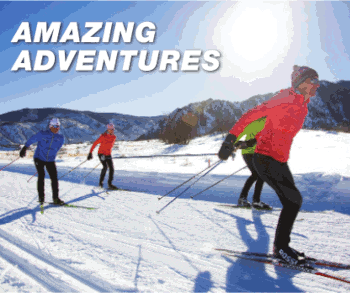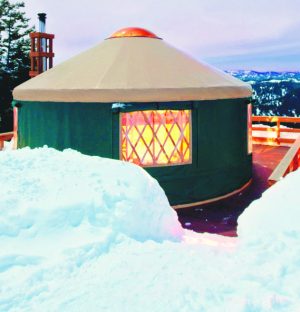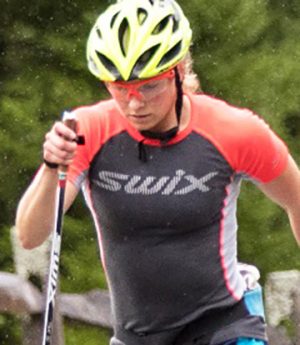SkiTrax received a copy of an April 14 email from USSA President and CEO, Tiger Shaw, to stakeholders explaining this decision. “Moving forward, we will continue to provide direct funding for qualifying elite athletes, but will no longer support the traditional team infrastructure.
“We will work with the Nordic combined community to look at alternatives in structure and funding. The USA has an engaged and passionate club-based pipeline, especially in communities of Lake Placid, Steamboat Springs and Park City. The USSA will continue to work with these clubs to provide an infrastructure for athletic success and sport development.”
SkiTrax spoke to NC head coach Dave Jarrett about this decision and how it will affect the sport going forward. We reached Jarrett near Park City, Utah where ski jumping competitions were held at the 2002 Salt Lake City Games.
Jarrett confirmed that the USSA usually provides annual funding of about $600,000 for the NC program and part of this includes his own salary. USSA funding will be cut at the end of July, 2014.
“This was part of strategic planning move and a ranking of teams. The USSA is putting resources where they think they see the most medal potential. It is based on their criteria,” commented Jarrett.
Among the criteria as noted by Shaw are four key areas: Relevance to stakeholders and public; Long-term viability; Potential for future elite success; Sustainability of the sport long-term.
The change comes only four short years after Vancouver 2010 where the U.S. Nordic Combined made history taking home four medals including Billy Demong’s gold in the individual large hill/10km event along with silver for Johnny Spillane in the same event plus another silver in individual normal hill/10km (Spillane has since retired). The squad of Demong, Spillane, Todd Lodwick and Brett Camerota also won silver in the team large hill/4x5km race for a truly memorable Games. Lodwick retired at the end of this season.Since then, there have been sparks of success including Nordic world championship medals, but the team has struggled to regain its previous prominent status and the Sochi 2014 Games were a disappointment as well. Now the axe has fallen.
USSA support will continue on an individual basis for NC’s brightest stars – Jarrett mentioned Demong together with Bryan and Taylor Fletcher as among these. “They would have to do whole thing on their own; it might give them some sort of chance. But it is hard to see unless they piggyback on other programs.” He was unsure of the dollar figures involved [a Utah-based newspaper puts these individual amounts at $40-$50,000/yr].
The silver lining might be how the USSA recognizes “…the passionate club-based pipeline, especially in communities of Lake Placid, Steamboat Springs and Park City. The USSA will continue to work with these clubs to provide an infrastructure for athletic success and sport development.”
SkiTrax also caught up Luke Bodensteiner, USSA Executive Vice President, Athletics who commented, “The international playing field for all sports has changed over the years and we have to adapt accordingly which means making some tough decisions not easily done. Our mandate includes managing 13 sports and we need to consider the long-term success of all of the players.
“That said, we’re intent on working with all parties associated with Nordic combined and try our best to secure funding for the program from the private and business sectors during the current period, and determine where things are in July.”
Jarrett is clearly disappointed by the USSA decision, but not surprised; he saw the writing on the wall. NC joined the National Nordic Foundation (NNF) a few years ago. NNF directly raises money for U.S. NC and cross-country skiing (over $300,000 overall for 2013) and there is some hope of minimum baseline funding. “NNF is a great vehicle. Monies can be raised and spent on the development side.”
Jarrett has had a long relationship with the USSA, but he questions parts of their rationale based on future Olympic medal counts, pointing to how there are three Olympic medals in NC versus only two in figure skating. He further points out that, on a worldwide basis, it is ski jumping that draws the biggest TV audiences at Winter Games. “Ski jumping has highest viewing numbers in Europe.” Ski jumping met a similar fate with USSA some years ago but has rallied to find support for the program and NC hopes to do the same.
Unfortunately, U.S.NC athletes are at a disadvantage compared to their European colleagues where there is government support to ski associations, “There is also the military option which pays athletes to pursue NC or biathlon. But here we have no government support. All monies are raised through sponsorships,” continued Jarrett.
The end of an Olympic quadrennial is a potent time for change and the US is not alone in dealing with funding issues as their counterparts in Canada are also facing cuts rumoured to be around 30% for their cross-country ski programs.
Some good news in the equation is that the USSA has also agreed to remove all encumbrances that might inhibit NC fundraising. “We’re pretty much looking at all options: uniforms, title sponsors, etc. We’re also talking with Alan Johnson of USA Ski Jumping and Robbie Beck of Women’s Ski Jumping USA to pick their brains to find out what works and what doesn’t.” Jarrett gives Johnson particular praise for…“Keeping that sport going and rallying the cause.”
Jarrett’s connection to his sport runs much deeper than simply his job as head coach, he was part of the U.S. Ski Team from 1992 to 1998 and his 11-year-old son, Jack enjoys NC. “Every junior and his or her parents are asking each other ‘should we continue with NC?’ They wonder if there is a light at the end of the tunnel…”
Possibly, part of the answer might be overseas funding of the U.S. NC team. In the meantime, Jarrett is thinking not only about fundraising, but how to direct his team. “We’re training as if season will start in November. That’s what athletes need to focus on. This entire funding thing is a big distraction!”
SkiTrax will continue to monitor this story






![National camp action [P]...](https://skitrax.com/wp-content/uploads/2019/08/Duluth-4-2019-08-08-at-10.46.51-AM-300x246.png)
![Matt Liebsch on the CXC Elite Team [P] CXC...](https://skitrax.com/wp-content/uploads/2019/08/Matt-Liebsch-CXC.2-525x700.4-300x267.jpg)
![Dan LaBlanc [P]...](https://skitrax.com/wp-content/uploads/2019/08/Dan-LaBlanc-img_1855.3.jpg)

![Tiger Shaw [P] USSA Tiger Shaw [P] USSA](http://skitrax.com/wp-content/uploads/2014/04/Tiger-Shaw-P-USSA-200x263.jpg)
![Dave Jarrett [P] USSA](http://skitrax.com/wp-content/uploads/2014/04/Dave-Jarrett-200x229.jpg)
![Luke Bodensteiner [P] USSA](http://skitrax.com/wp-content/uploads/2014/04/Luke-Bodensteiner.jpg)